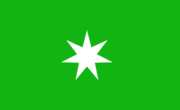Liberal Party (Wallenland)
Liberal Party Pártidò Liberal | |
|---|---|
| Leader | Lázaro Katorò Jr. |
| Chairperson | Ana-Estela Sábataòpadot |
| Founded | December 6, 1912 |
| Headquarters | Valhókoà, Wallenland |
| Ideology | Liberal, |
| Political position | centre to centre-left |
| Colors | Green |
| Lower Chamber | 8 / 250 |
| Higher Chamber | 2 / 100 |
| Governors | 0 / 9 |
| Party flag | |
 | |
The Liberal Party or Pártidò Liberal in Olílò is a political party that follows both liberalism and social liberalism and is the oldest existing party in Wallenland, founded in 1912. The party has its origins in the White Palace Conference in 1912 during the Wallene Civil War which saw the factions of the Liberals unite into the Liberal Union. By around the end of the civil war, the party renamed itself to the Liberal Party. The party dominated Dominion politics, holding the position of prime minister 9 times before the advent of World War. During the World War, power was mostly diverted to the Quetanan Armed Forces and leaving Yosef Ben-Eliyahu, then-prime minister, as a figurehead. Powers were reverted after the war but in December 1955, Augusto pā Wālolénlò dissolved Ben-Eliyahu's government and appointed Baihàverdat Tiagopāfiolò as prime minister who in turn declared martial law. In November 1957, Wallenland gained independence and a new constituition was written by a 26 member committee that included 7 Liberal Party high-ranking members. Post-independence, the Liberal Party gradually lost significance, though they managed to win the 1973 general election, and after the 2000s and reestablishment of democracy, they often gained constituencies in single-digits.
Nowadays, the party draws to both liberalism and social democracy and the voters' composition mainly consisting of college-educated professionals.